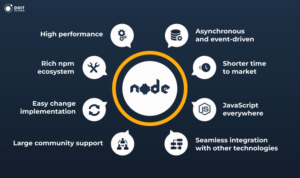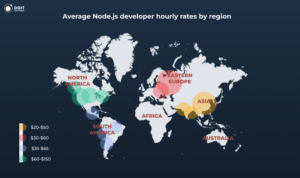According to Stack Overflow, Node.js is the most popular server-side technology in 2025, with adoption by over 40.8% of global coders. However, to hire Node.js developers, you must have relevant tech and recruiting expertise. If you want access to top talent, this article is your one-stop guide. Below, you will find:
So, let’s start our overview of how to hire Node.js developers to fit your project’s requirements.
Node.js is a versatile, open-source, cross-platform JavaScript runtime environment that helps developers build scalable network apps that run on Windows, Linux, and macOS. Node.js has a rich framework and library ecosystem. You can access it through npm, the largest software registry, which contains over 2.1 million packages.
Many companies prefer Node.js for its high performance and scalability. Let’s explore the benefits that make hiring Node.js developers a popular choice for businesses.

Consider whether your project might benefit from these full-stack combinations. It can help you hire Node.js developers with the right mix of skills to seamlessly handle both front-end and back-end development.
Now that you know what Node.js is, it’s time to figure out how to hire specialists in this technology. Here’s a quick look at what a standard plan looks like:
Let’s go through each step in more detail.
A Node.js developer is a software engineer who builds server-side applications and APIs using Node.js, a JavaScript runtime environment. These coders work on the back-end that powers web applications and mobile apps.
Your decision to hire Node.js programmers must depend on their experience and expertise. If you already have an existing programming team, consult with them to see what expertise you’re missing. Determine if you need a Node.js expert with backend knowledge only or if you should look into full-stack options. Also, decide what level of expertise you need.
Below are the essential hard skills to look for:
JavaScript is the foundation of Node.js development. A proficient Node.js developer must know closures, event loops, promises, and asynchronous programming (callbacks, async/await). They should also be familiar with modern syntax and object-oriented programming to design modular and reusable code.
Developers must understand Node.js’s non-blocking I/O, event emitter and streams, file system, CommonJS, and ES6 modules and its performance optimization.
Node.js developers must work with both relational and non-relational databases. For example, you can look for experience in
Node.js developers should know how to design and build APIs. They need to have experience working with RESTful or GraphQL APIs. Also, look for expertise in backward compatibility and proper API versioning.
Besides the above, Node.js developer hard skills may include:
When you want to hire senior Node.js developers, it’s essential to look beyond the basic skills. For example, senior coders should be proficient in microservices. They should have experience with CI/CD pipelines, containerization, and orchestration. Strong knowledge of AWS, Azure, or Google Cloud cloud platforms is also beneficial.
When you look for a Tech Lead, pay attention to team management or mentorship experience. Tech Leads need to be able to guide the team through complex projects and maintain clear communication.
Let’s move to the next step. An effective job description should outline the role, responsibilities, required skills, and qualifications. Here’s a guide to help you craft a comprehensive job ad to hire Node.js developers.

Start with a clear and specific job title, such as:
Provide a brief overview of the role. Include the primary responsibilities and the position’s purpose.
For example, you can write: “We are looking for a skilled Node.js Developer to join our dynamic team. You will be responsible for developing and maintaining server-side applications. You will work closely with front-end developers to integrate elements into the app.”
List the key responsibilities associated with the role. Be specific about what the candidate will do daily. Here’s an example:
Outline the essential qualifications, skills, and experience required for the role. This section helps filter candidates based on their capabilities. Here is a rough list that you can modify as needed:
Include any extra skills that would be beneficial but are not strictly necessary. For example, you can mention experience with cloud platforms (e.g., AWS, Azure, Google Cloud) or familiarity with test-driven development (TDD). Of course, depending on the project’s needs, these may also be mandatory requirements.
Highlight the personal attributes and soft skills that are important for the role. Here are some popular choices:
Briefly describe your company, its culture, and what makes it a great place to work. It will help you hire Node.js developers who understand your organization’s structure and goals.
List the benefits and perks that come with the job. It can attract top talent by showcasing what you offer beyond the basic salary. For example, you can include:
Provide clear instructions on how to apply for the position. Include any required materials (e.g., resume, cover letter, portfolio) and deadlines if applicable. You can also describe how the selection process for this position usually goes. For example, it can contain an initial call, coding test, technical interview, final meeting, and job offer.
Next, post a ready-made Node.js developer job description on job boards or hand it over to a staffing company. We’ll explore specific platform examples later in the article. So, for now, let’s move to the candidate testing stage.
It’s a good idea to do some technical testing on the shortlisted candidates and discuss the results at the meeting. Below is a table that will help you clarify the candidate’s skills and what technologies you need to test.
Node.js versions
Node.js 18.x – Node.js 24.x
Languages
JavaScript, TypeScript
Web frameworks
Express.js, Koa.js, Nest.js, Hapi.js, Sails.js, Meteor.js
Desktop frameworks
Electron
Communication frameworks
Socket.io, WebRTC, MQTT, AMQP (RabbitMQ)
IoC Containers
InversifyJS, Awilix
ORM/ODM
Sequelize, TypeORM, Mongoose
Unit testing frameworks
Mocha, Jest
Build tools
Jenkins, CircleCI, GitHub Actions, GitLab CI
Besides, consider inviting a tech expert to the interview. It should be a Middle+ programmer with a similar focus who can assess the candidate’s practical skills. Here are some key points you should discuss to hire Node.js developers suitable for your project:
Besides tech knowledge, it is equally important to discuss soft skills. During the interview, pay attention to how the candidate answers your questions. A developer who can explain the technical aspects of the job and can take feedback will make a positive contribution to the team dynamic.
Also, assess the candidate’s ability to solve problems. Ask them to describe the challenges they’ve faced in previous projects and how they handled them. Assess their teamwork skills by discussing their role in earlier projects. Find out if they have experience working in cross-functional teams and how they manage deadlines.
Now, let’s explore the options where you can hire a Node.js programmer for your team.

In-house recruitment involves hiring full-time developers who become integral members of your organization. These coders are either stationed at your office or work remotely as permanent employees. This model is suitable for long-term projects requiring ongoing development and maintenance.
You can find Node.js developers through LinkedIn, Indeed, and Glassdoor job boards. Also, there are some tech-specific job platforms such as Stack Overflow Jobs and GitHub Jobs.
However, keep in mind that the recruitment process for in-house developers can be lengthy and resource-intensive. As a rule, it involves many rounds of interviews, technical tests, and onboarding procedures.
If your team doesn’t have a skilled technical recruiter, we recommend you consider an IT recruitment agency as your partner. They will handle the candidate selection and testing so you can focus on your core business functions. Such agencies usually charge up to 25% of the annual salary of a hired staff.
You can hire freelance Node.js developers on a contract basis to work on specific tasks. They are not permanent employees and usually work remotely. This model is suitable for short-term projects requiring specialized skills.
The most popular freelance platforms that allow you to hire Node.js developers are Upwork, Toptal, and Freelancer. Here, you can check portfolios, read client reviews, and conduct interviews.
And the model we recommend is IT staff augmentation. Here, you partner with a staffing agency to extend your team with skilled developers. Coders work alongside your in-house team but without the long-term hiring commitment.
You can also participate in final interviews to ensure pre-selected candidates fit your requirements. Once you select one, staffing experts start the onboarding process and take care of all administrative issues.
With DOIT Software, you can hire dedicated Node.js developers at a $0 recruitment cost. You will only pay the hourly or monthly rates of our top coders. Moreover, we will handle payroll, office space, taxes, HR, and legal support. You also are free to hire Node.js experts from Eastern Europe or LATAM to reduce costs by up to 60%, compared to in-house recruitment.
Node.js developers are in high market demand, which affects their rates. As of January 2025, LinkedIn alone has published over 32,161 Node.js jobs in the US. On average, top Node.js developers worldwide earn $55-90 per hour.
But keep in mind that these rates vary depending on the engagement model. The cost when you hire offshore Node.js developers vs in-house recruiting can differ significantly. So, let’s take a closer look at the contract coders’ rates and salaries of permanent employees.

According to available job postings in 2025, you can hire a Node.js developer in the USA for an average of $116,508 – $180,182 per year. Besides salary, you must also budget for health insurance, paid time off, and other perks.
US
$116,508 - $180,182
UK
$42,087 - $86,741
Canada
$47,279 - $75,656
Germany
$56,994 - $81,767
Switzerland
$102,660 - $139,484
Netherlands
$36,240 - $69,500
Norway
$60,983 - $73,743
Eastern Europe
$23,799 - $55,448
Latin America
$19,895 - $54,686
Source: Average Node.js developer salary per year by country/region based on job postings on Glassdoor, Indeed, and StackOverflow surveys.

Freelance costs for Node.js developers also vary based on experience, location, and project complexity. Rates range from $35 to $150 per hour.
$60 - $150
$50 - $120
$30 - $70
$35 - $75
While this model can be more affordable, costs can escalate for specialized tasks or urgent projects. You need to establish clear contracts and milestones to manage these expenses.
Candidate search and selection is a long process that can feel daunting at times. To hire Node.js developers, you need to:
By augmenting Node.js staff with DOIT Software, you can skip all these stages and get the right talent without the hassle of recruiting. Share your requirements, and we’ll provide you with the first relevant CVs in a few days.
Get a consultation and start building your dream team ASAP.
REQUEST CVSA Node.js developer can cost anywhere from $42,087/year for a junior position in Western Europe and up to $179,000/year for a senior candidate in the US. The average rate for a Node.js developer in Eastern Europe and LATAM is $30-60/hour.
Yes, Node.js developers are among the most in-demand for web coding. In 2025, almost every second (40.7%) professional programmer uses Node.js. Expertise in this technology is often used in popular full-stack combinations such as MEAN, MERN, and MEVN. As of January 2025, 32k+ Node.js developer jobs in the US are available on the LinkedIn platform alone.
A Node.js developer builds and maintains server-side applications and APIs using JavaScript and Node.js, a fast, event-driven runtime. They develop backend logic, handle server-side processes, implement RESTful or GraphQL APIs, and manage data storage solutions.
If you want to hire Node.js developers in-house, expect to spend around 2-3 months. Hiring specialists through IT staff augmentation services, in turn, takes 2-4 weeks.










